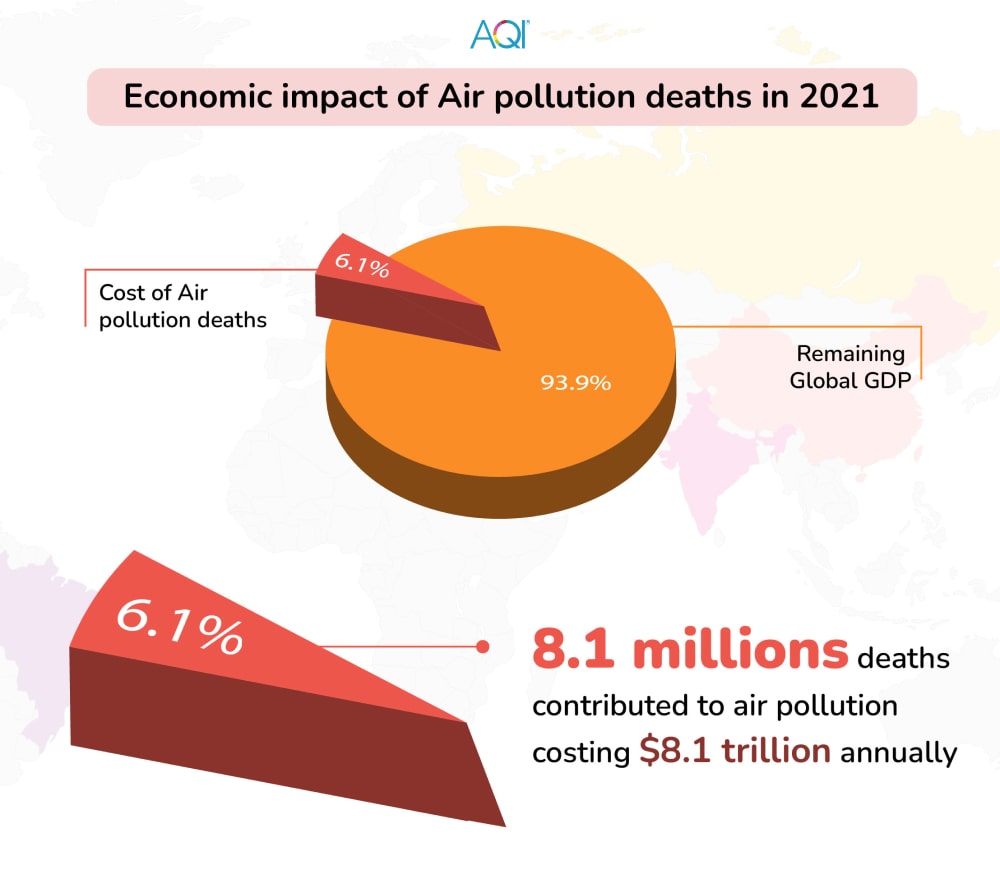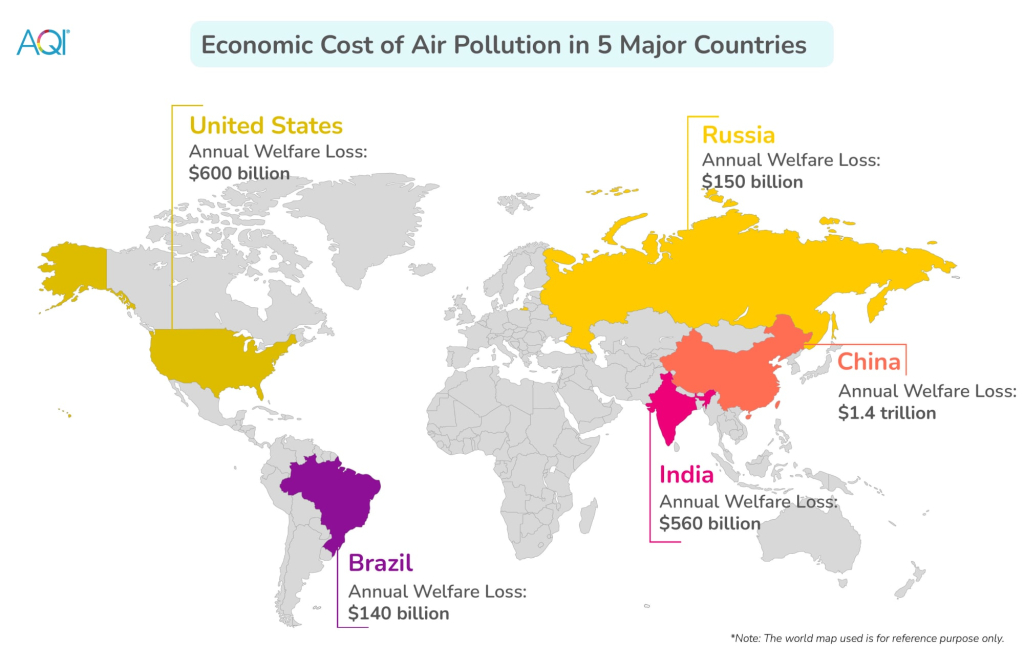Did you know air pollution is killing 7 million people every year? According to WHO, every year 7 million people are losing their lives due to air pollution exposure. Mostly, everyone neglects the air pollution conditions and its effects on every person. However, its mortality effects are a major threat to the entire globe. As a result, these public health conditions significantly impacting the economic cost of air pollution.
Some nations experience high levels of air pollution. It is impacting their economy and health as well and costing billions. Air pollution affects businesses through workforce, absences, premature deaths and affecting agriculture. Thus, understanding its impacts is necessary to combat it. Here in the blog, you can delve into the aspects of the economic cost of air pollution.
How does air pollution affect the global economy?
According to The State of Global Air 2024 reports, 8.1 million deaths contributed to air pollution in 2021. Mortality and morbidity due to air pollution affect countries GDP (Gross Domestic Product). And GDP contributes to the country’s economy. Hence, these 8.1 million deaths cost around $8.1 trillion annually to the global economy. It is about 6.1% of global GDP. But how it is affecting the global economy? It stems from various factors including healthcare expenses, labour productivity and premature deaths.

1. Healthcare costs:
Particulate Matter (PM2.5) and other pollutants lead to many health issues. Hence, it increases the hospitalizations of patients facing heart disease, stroke, lung cancer, and chronic respiratory diseases, and lower respiratory infections. Hospital admissions, medication, and long-term care includes in the expenses and affect the economic cost of air pollution.
For instance, A report by EEA (European Environment Agency) reported €330 billion and €940 billion per year in healthcare costs due to air pollution in European countries in 2020.
2. Affects productivity:
Secondly, it also decreases the productivity in the labour class because of above mentioned health issues. Because of this, workers’ efficiency is reduced in jobs and workplaces. To emphasize it, a study by the International Labour Organization (ILO) revealed that air pollution affected labour income. Since it decreases the physical and cognitive function.
3. Premature Deaths:
Many reports and studies have revealed that air pollution is taking many lives every year. As a result, premature deaths significantly cause productivity loss, medical expenses, and emotional tolls of near ones. Hence, the emotional loss cannot be calculate with any money.
4. Agriculture:
High air pollution affects the global crop yields. As many greenhouse gases emission contributes to acid rains and smog it affects crop production. Ground-level ozone and Nitrogen dioxide significantly affect crop yields. A study indicates that 5% to 12% yield losses globally due to these pollutants. And it resulted in around $20 billion per year loss in the economy. Because it impacts the food supply chain, affects food prices and causes problems for farmers and consumers.
5. Other sectors:
Lastly, it also plays a significant role in tourism and property. Because tourist mostly visits regions with good environment and air quality. And poor air quality can affect the tourism industry which significantly impacts the economy. The National Bureau of Economic Research (NBER) study shows that air pollution affects tourism and causes revenue losses. Moreover, air pollution also impacts the real estate business by affecting property value.
Economic Cost of Air Pollution in 5 Major Countries:
Air pollution affects many sectors and causes a critical issue. To cover the globe, we are considering major 5 countries data of 2019. The data on the economic loss is collected from many studies and reports including World Bank Report, Greenpeace Report etc. Let’s know the global economy cost of air pollution:

China:
- Annual Welfare Loss: $1.4 trillion
- Premature Deaths: 1.2 million annually
India
- Annual Welfare Loss: $560 billion
- Premature Deaths: 1.67 million annually
United States
- Annual Welfare Loss: $600 billion
- Premature Deaths: 100,000 annually
Russia
- Annual Welfare Loss: $150 billion
- Premature Deaths: 120,000 annually
Brazil
- Annual Welfare Loss: $140 billion
- Premature Deaths: 50,000 annually
What is the cost of combating air pollution?
Addressing air pollution is necessary to control deadly outcomes. Many regulations and policies implemented for mitigation. However, these combating solutions also outweigh the air pollution cost. With it, advanced technology requirements also significantly impact the economy. Know about the economic cost of air pollution that is saved with mitigation:
1. Policies and regulations:
Pollution control boards and governmental agencies implement regulations and policies to reduce emissions. To support it, worldwide governments invest in mitigation strategies. However, it is also reducing various costs caused by air pollution. For instance, a report by the United States Environmental Protection Agency (EPA) estimated the cost. They found out that the Clean Air Act has saved up to $2 trillion by preventing premature deaths and healthcare charges in the US economy.
2. Investments in the technology:
Clean technologies are increasing and highly crucial for air pollution combating. For this, the government is investing in renewable energy options to save the global economy. It includes renewable energy sources, electric vehicles and advanced filtration systems for less emission and pollution control. For example, according to a report by the International Renewable Energy Agency (IRENA), it can save up to $160 trillion by 2050.
3. Public awareness:
Air pollution awareness with campaigns and encouragement can be costly. It includes various initiatives for pollution reduction efforts. For example, the European Commission has allocated €2.5 billion to raise public awareness of air quality and pollution for 6 years from 2021 to 2027.
4. Health investments:
Healthcare infrastructure to treat air pollution-related conditions can affect the cost. But it can also improve the public health and productivity to benefit the economy. To emphasize, the data from National Health Accounts estimated $11.9 billion in healthcare expenditure due to air pollution. It is a total of 0.44% of GDP of India.
Conclusion:
In the end, the economic cost of air pollution is affecting multiple sectors and costing trillion dollars every year. But, the air pollution combating investment in regulations, technologies, and awareness can help in saving the staggering cost. It also helps in economic growth and sustainability.
This post is also available in:
![]() Global
Global